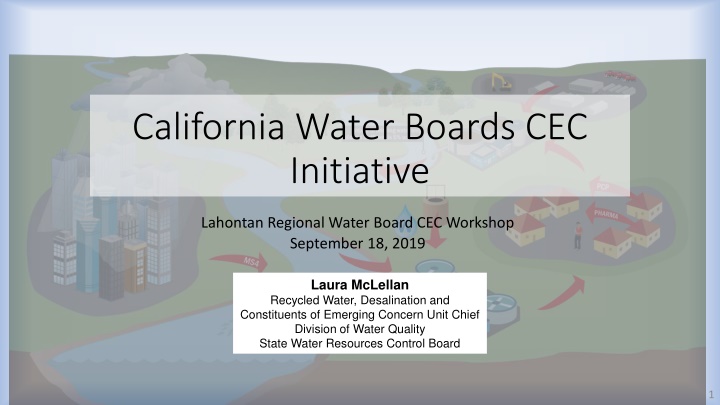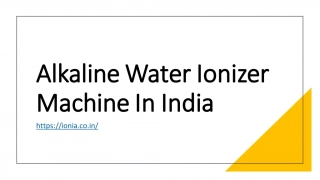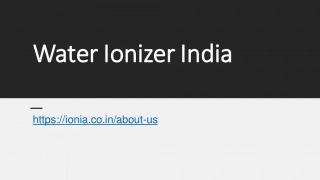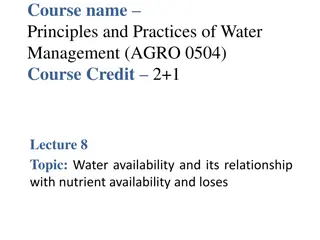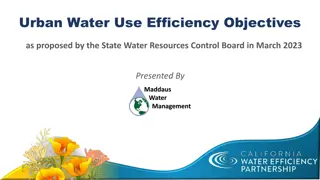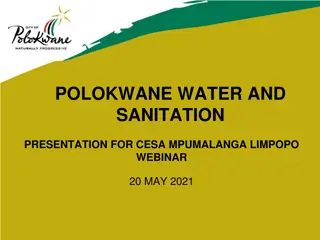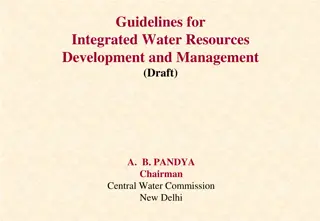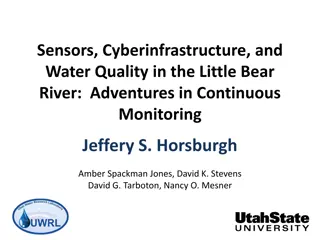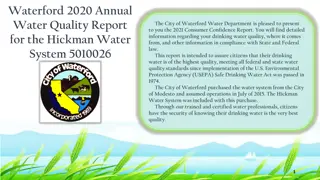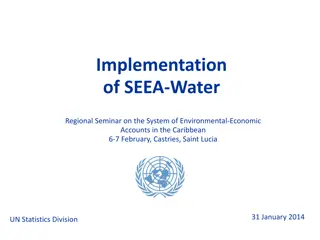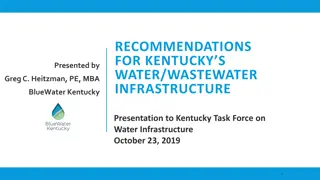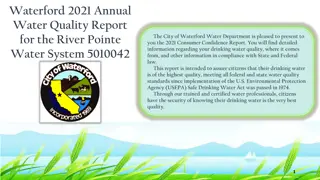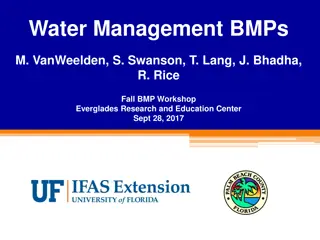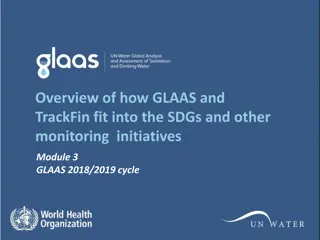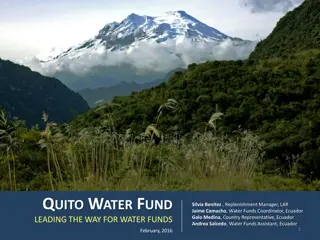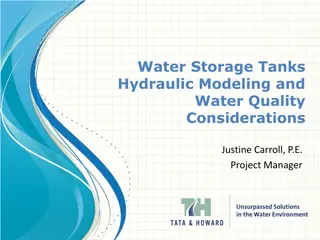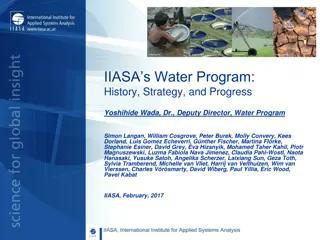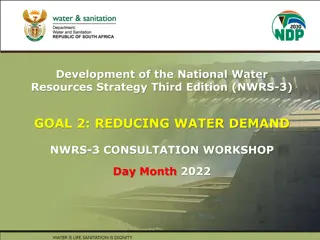Addressing Challenges in Water Quality Management
In a workshop by California Water Boards CEC Initiative, Laura McLellan discusses various issues related to Recycled Water, Desalination, and Constituents of Emerging Concern (CECs) in water systems. The presentation highlights the history, ongoing work, and challenges faced in managing CECs, including disagreements on definitions, diverse chemical properties, analytical complexities, and data gaps. McLellan emphasizes the importance of applying innovative strategies to tackle these challenges, focusing on the need for action, transparency, and effective communication to safeguard water quality.
Download Presentation

Please find below an Image/Link to download the presentation.
The content on the website is provided AS IS for your information and personal use only. It may not be sold, licensed, or shared on other websites without obtaining consent from the author.If you encounter any issues during the download, it is possible that the publisher has removed the file from their server.
You are allowed to download the files provided on this website for personal or commercial use, subject to the condition that they are used lawfully. All files are the property of their respective owners.
The content on the website is provided AS IS for your information and personal use only. It may not be sold, licensed, or shared on other websites without obtaining consent from the author.
E N D
Presentation Transcript
California Water Boards CEC Initiative Lahontan Regional Water Board CEC Workshop September 18, 2019 Laura McLellan Recycled Water, Desalination and Constituents of Emerging Concern Unit Chief Division of Water Quality State Water Resources Control Board 1
Region 6 CEC Workshop 09/18/2019 McLellan Presentation Overview Framing the issue History and current CEC work at the Water Boards Advancing the science to fill the gaps Developing a statewide management strategy 2
Region 6 CEC Workshop 09/18/2019 McLellan Constituents of Emerging Concern (CECs) Commercial and industrial compounds Endocrine disrupting compounds Plastics Pharmaceuticals and personal care products Pesticides Byproducts and daughter compounds Antibiotic resistant bacteria/antibiotic resistance genes 3
Region 6 CEC Workshop Challenges with CECs 09/18/2019 McLellan Disagreements on definition Growing number of CECs Diverse chemical properties Analytically challenging Data gaps (e.g., occurrence, toxicity, pharmacokinetics, metabolomics) Mixtures 4
How do we begin to address these challenges? Region 6 CEC Workshop 09/18/2019 McLellan Applying standard permitting paradigm to CECs is not feasible or advisable Flint, Hinkley, etc. demonstrate need for action, accountability, and transparency Sharing the information without having all the answers Messaging and strategy become critically important 5
Region 6 CEC Workshop Science Informs Policy and Research 09/18/2019 McLellan 2010 2016 2014 2012 2018 Science Advisory Panel Reports Ongoing Ongoing 2013 Ongoing Regional Surface Water Monitoring 2018 Bioanalytical screening tool research Direct Potable Reuse Research, future regulation Recycled Water Policy Amendment Recycled Water Policy Amendment 6
Region 6 CEC Workshop 2012 Science Advisory Panel: CECs in Ambient Ecosystems 09/18/2019 McLellan 7
Region 6 CEC Workshop CEC Screening Tools 09/18/2019 McLellan Non-targeted Analytical (NTA) Targeted Chemistry Bioanalytical Known Unknowns Unknown Unknowns Known Knowns Analytical methods and standards are available Physiological responses and categories of CECs Molecular fingerprinting and forensics 8
Region 6 CEC Workshop 09/18/2019 McLellan CEC Ambient Monitoring Framework Bioanalytical Tier I Screening Targeted Chemistry (in vitro cell bioassays) Tier II Diagnostic Non-targeted Analytical (NTA) Toxicity Testing (Whole Animal) Tier III Confirmatory Field Survey 9
Region 6 CEC Workshop 09/18/2019 McLellan CEC Projects at the Regional Water Boards Data are emerging, and some regions have robust data sets Pilot test the panel s ambient monitoring framework & report back 10
Region 6 CEC Workshop 09/18/2019 CEC Initiative: Regional Actions Regional Board Update 1: North Coast Conducted monitoring for pesticides in Russian River watershed. All CECs detected were below monitoring trigger levels. Final report released in 2018. SF Bay RMP produced synthesis of CEC data in 2013. Revised emerging contaminant strategy in 2018. Conducted non-targeted monitoring study in 2018-2019. No update available. Conducting CEC bioanalytical study along with non-targeted chemical analysis in 2018 bight sediment and fish samples with SCCWRP. Implemented bioassay monitoring program to identify pesticides as impairing beneficial uses and adopted TMDLs in response. Intends to develop comprehensive program to reduce CEC discharges to sewer systems and storm drains. CEC Board workshop 2019 No update available. Conducting surface water monitoring for CECs using bioanalytical tools and non-targeted chemical analysis (2015-2019). Conducting follow-up (2020) to pilot CEC monitoring study (2010-2011) which identified presence, patterns and potential sources of PPCPs in the region. Conducting follow-up to 2016 study on harmful cyanobacteria blooms found in surface water. 2: San Francisco Bay 3: Central Coast 4: Los Angeles 5: Central Valley 6: Lahontan 7: Colorado River Basin 8: Santa Ana 9: San Diego 11 11
Region 6 CEC Workshop 09/18/2019 CEC Initiative Overview Vision Vision Coordinate ongoing CEC monitoring efforts in the state Framework for statewide prioritization and management of CECs Three phases: Compile existing knowledge and resources Improve coordination between State and Regional Water Boards Develop statewide management strategy CEC Management Strategy Amazon Sorting Facility on- and off-ramps 12
Region 6 CEC Workshop 09/18/2019 CEC Initiative Overview Phases Phases Phase 1: Fact-Finding Phase (2016 Now) Compile existing knowledge related to CECs across the State. Improve coordination between the State and Regional Water Boards, identify key data gaps, evaluate regulatory mechanisms. Phase 2: Collaborative and Investigative Phase (Now - March 2021) Coordinate with Water Boards & other groups (state and federal agencies, water districts, environmental advocacy groups, etc.). Identify data gaps; what s working and not working with pilot monitoring framework; fill the gaps Phase 3: Strategy Application Phase (March 2021-2023) Implement inter-agency statewide CEC management strategy with regulatory actions Refinement and evolve CEC management strategy Consistent data reporting from potable water facilities and functional dashboard summarizing performance of potable reuse projects 13
Region 6 CEC Workshop Developing a Successful CEC Management Strategy CECs are not just a concern in recycled water 09/18/2019 McLellan Must be based on sound science Work with experts to identify and address research needs Adaptive management framework Communication and public outreach Collaboration 14 14
Region 6 CEC Workshop 09/18/2019 McLellan CEC Research Needs Improve screening tools Develop standard methods Develop an interpretive framework Identify CECs of greatest risk to human health and wildlife Are there monitoring methods for it? Improve source control Optimize treatment trains Is it present at a concentration of concern? 15
Region 6 CEC Workshop 09/18/2019 McLellan 2020-2021 CEC Science Advisory Panel for Aquatic Ecosystems 2020-2021 Data compilation and synthesis of CECs 16
Questions? Laura McLellan Recycled Water, Desalination and Constituents of Emerging Concern Unit Chief Division of Water Quality State Water Resources Control Board Laura.McLellan@waterboards.ca.gov 17
